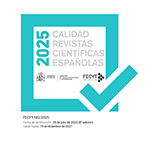Teoría del discurso y paradigmas arqueológicos
Abstract
Se presenta una revisión de la teoría y metodología actuales de análisis del discurso, tanto general como más concretamente de los discursos político y científico, optando por la posición postestructuralista de la “teoría del discurso” de Ernesto Laclau y la “Escuela de Essex”. Tras analizar las posturas teóricas de la arqueología española actual, se hace un “análisis de contenido” cuantitativo de cuatro artículos en castellano, representativos de los paradigmas teóricos actuales más extendidos. Empleando la idea lacaniana de los “puntos nodales” (point de capiton) que dan sentido a los discursos, se advierte cómo los paradigmas más empiricistas (procesualismo, marxismo) necesitan de una mayor fijación del sentido de sus significantes (por los puntos nodales de “economía” y “producción”) que los paradigmas estructuralista y posprocesual, los cuales admiten una mayor dispersión temática e indeterminación de los significantes.Downloads
##submission.format##
Licenza
La revista Complutum, para fomentar el intercambio global del conocimiento, facilita el acceso sin restricciones a sus contenidos desde el momento de su publicación en la presente edición electrónica, y por eso es una revista de acceso abierto. Los originales publicados en esta revista son propiedad de la Universidad Complutense de Madrid y es obligatorio citar su procedencia en cualquier reproducción total o parcial. Todos los contenidos se distribuyen bajo una licencia de uso y distribución Creative Commons Reconocimiento 4.0 (CC BY 4.0). Esta circunstancia ha de hacerse constar expresamente de esta forma cuando sea necesario. Puede consultar la versión informativa y el texto legal de la licencia.










